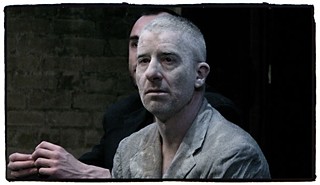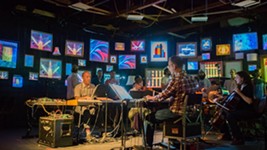Finding Refuge
UT theatre students cross borders with the acclaimed artists of the Moving Company in Refugia
By Robert Faires, Fri., Feb. 6, 2015
Millions fleeing Syria for safe haven in Turkey, Lebanon, Jordan, and Iraq. Hundreds of thousands entering the U.S. from Mexico each year. One Estonian composer emigrating to the West from the Soviet Union. These compelling tales of people crossing borders struck a chord with the members of the Moving Company, an accomplished theatre troupe that rose from the ashes of the Tony Award-winning Theatre de la Jeune Lune – so much so that they decided to use them to make a play, one exploring exile, immigration, and borders – the ones between nations but also ones between people, cultures, life and death. And to help them develop it, they turned to students in the University of Texas Department of Theatre & Dance. This weekend, the fruit of their labors, Refugia, opens in the B. Iden Payne Theatre.
True to its name, the Moving Company gets around. Austin. Louisville. Davis, Calif. Iowa City. Washington, D.C. Though members Steven Epp, Dominique Serrand, Christina Baldwin, and Nathan Keepers all live in Minneapolis and produce most of their work there, they maintain no home theatre, as Jeune Lune did. Much of their time is spent on the road, presenting the company's finished works and devising new ones, often in partnership with university theatre departments, which enables the Moving Company to do basically "R&D" on its productions, says Epp. "We get to see the show fully realized, fully costumed, designed, built, and performed in front of an audience, [which] informs us hugely what's there – if there's something there [laughs] – that can then be grown into a fully developed piece." But the challenge with it is, "it's a very fast process." For Refugia, company members spent two weeks in Austin in October developing the concept and preliminary designs, all of which are being handled by MFA students and auditioning undergrad acting students. They had two months to structure the piece, then returned to town with just five weeks to build and mount the show. "It's a short amount of time to generate and shape and hone and fully write a new piece. So we move fast. We make some quick decisions, we let go of certain things and home in on what's working now."
Devising new work in such a tight time frame is not for all students, which made casting "a tricky sort of chicken-and-egg moment," says Epp. "We knew enough to know what we thought we were going to need. We also knew that we don't really know, so you have to punt a little bit. Mostly we look for kids who are game, open, playful, seem interested, have a bit of an opinion, and feel like they would want to engage in this kind of work. Some actors are only interested in being handed a part and learning their lines. This is a very different beast – especially at this phase, when it's still being discovered and found. If you're open to it and know how to look at what it is, it can be incredibly empowering and eye-opening for an actor. If you're really paying attention, you can learn so much about how theatre actually works."
With Refugia, that can mean learning how the Moving Company members approach their craft. Epp says this is the first time he and his colleagues have performed with students: "We're finding that to be really beneficial, because by being onstage with us, they're able to see what we do and how we go at things, and that energizes them and widens their view of what's possible for an actor to try in the room. And watch us fail – fail miserably – and [see] where we find things and how we find things and what do we do with that and how it gets honed and shaped and crafted."
Like the characters in its stories, the artists have taken a journey with Refugia. "Every piece is leaping into unknown territory," says Epp. "That's the nature of creating theatre, and it's even true when you have a solid play in front of you. It's always, on a certain level, terrifying and unknown. So that artistic process, it's not like going into exile or being a refugee, but you're heading off into the unknown and it is like crossing a border. You're just hoping you're going to find a place that's warm and safe." The students started in a place, he says, wondering "'Who the hell are these people and where are they leading us?' And they've watched it coalesce into something that we all now have a grasp on and are starting to feel excited about and that there's something beautiful there. The piece is very funny and very moving and very odd and very evocative – it's a lot of different things. And some of it, we don't know quite what the impact of that moment is, but it feels potent. So I think everyone feels the sense of being on that journey. It's exciting. We're making something that never existed before."
Refugia runs Feb. 12-15, Thu.-Sat., 7:30pm; Sat.-Sun., 2pm, in the B. Iden Payne Theatre, 300 E. 23rd, UT campus. For more information, visit www.jointhedrama.org.











